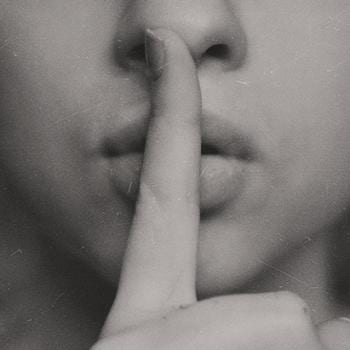Hello again, beautiful creatures. Previously on Outside the Charmed Circle, I continued my thoughts on the issue of separating politics from spirituality, and concluded with the following statement: “…compartmentalizing our lives so we can claim to be apolitical is a privilege, one afforded to those whose lives aren’t endangered by politics.”
Today, I’m going to try to expand on that statement some, and to fold in some practical suggestions for folks who might see themselves unpleasantly reflected in that statement. And, just so it’s clear, I absolutely include myself in that number. I belong to some marginalized groups: I’m a multiply-queer, nonbinary survivor of child abuse who grew up poor, and I belong to a minority religious group with a dubious reputation in much of American culture. However, I also belong to some highly privileged groups: I’m a white, mostly able-bodied, university-educated American, semi-comfortably ensconced in the dwindling middle class of the U.S., who can pass for a cisgender, heterosexual male.
I don’t bring up my marginalizations to dismiss my privileges, but to put both categories in context with one another. I am directly subjected to some political developments, and largely insulated from others. Political movements targeting queer and trans people and legislation enforcing Christian religious doctrine in the public sphere have a direct impact on me, while political movements targeting people of color and legislation disempowering people with disabilities have less of an impact.
To put it more viscerally: while in some ways, America hates me, in other ways I’m as safe as houses. That’s privilege.
Like politics, privilege is a loaded term in today’s America, and many people have what I can only describe as an allergic reaction when it comes up in conversation. I will also note that, in my experience, the vast majority of those allergic folks are white Americans of European descent. As a possible treatment for these allergies—which are deeply, inextricably related—I’d like to suggest a practical course of action, in two parts: education and contemplation.

Education, or, “Why Is Everyone So Mad at Me All The Time?”
One of my mother’s favorite saying when I was growing up was, “I can deal with anything, as long as I know what’s going on.” The obvious corollary is that we can’t deal with anything if we don’t know what’s going on. Those of us who’ve engaged in social and political discourse around issues of privilege, especially where race or gender are concerned, may have encountered the phrase “educate yourself,” sometimes spoken with rather more ire than we might be comfortable hearing. This can be an uncomfortable, even painful thing to hear, especially when we feel like we’re trying to be allies, but it’s often a necessary indicator that we’ve missed something. People with privilege are told to educate ourselves because…
- it’s obvious we don’t understand the situation,
- our lack of understanding is what creates and perpetuates the systems of power in place,
- those systems of power are literally killing people, and
- the people marginalized by those systems are too busy trying to stay alive to take on the job of educating us.
Of course, when we don’t even know what it is we don’t know, being told to go educate ourselves can feel less than helpful, and can leave us feeling rejected, attacked, frustrated, and hurt when we’re sincerely trying to do the right thing.
And that can really suck.
Fortunately, there are a lot of folks out here who’ve taken on the task of educating people on these issues. Writers like Ta-Nehisi Coates, Ijeoma Oluo, and Damon Young have made a breathtaking amount of work on race (and gender, sexuality, and politics) available in print and online. Similarly, writers like Julia Serano, Emi Koyama, and Lindy West offer a breadth and depth of perspectives on feminism (and gender, sexuality, and politics), also in print and online. Any of these folks would be a marvelous place to begin your self-education on the issues they address. (And if you feel you’ve gotten value from their work, I highly encourage you to buy their books, buy tickets to see them in person, and share their writings with others.)
How does that all intersect with politics?
Contemplation: A Thought Experiment in Politics, Privilege, and Power
In the post previous to the previous one, I put forward the notion that politics doesn’t mean “what politicians do,” but rather “the ways we negotiate power in community.” I know this is a repellent notion for some folks, but I really do think it’s an important point to get. Politics is about how we share (or don’t share) power with each other, and if we consign it to the nether realms, we are literally giving away power, surrendering it to a professional political class which is more than happy to accept it. Can we honestly be surprised, then, when that political class acts in its own best interests, rather than ours? (Spoiler alert: no.)
The trouble is, we’re responsible for what’s done with our power, whether we claim it or deny it. If we claim it, or reclaim it, we accept that responsibility, but we also get to choose. We can decide how (or if) that power is used, and for whom. We can act in what we think are our own best interests, or on behalf of everyone in our community, for the greater good. That’s the problem democracy was intended to solve, but all too often, democracy is derailed by that desire to advance our own status, usually at someone else’s expense… and we’re back to privilege, and power.
Philosopher John Rawls posited a solution for this question in his 1971 book A Theory of Justice. Consider the following thought experiment: you have been appointed supreme legislator, occupying what Rawls calls the original position. Starting tomorrow, society will be reordered to your wishes, and all laws, ethical standards, and cultural norms will be whatever you dictate. There’s a catch, though: you don’t get to know what position you’ll hold in this new society. You’re behind the veil of ignorance: you won’t know your own skin color, your economic status, your sexual orientation or tastes, not even your gender, until the big reveal tomorrow. Do you construct a society where some groups of people are privileged over others, banking on the possibility that you’ll get lucky… and risking the possibility of ending up at the bottom of the social hierarchy? Or do you try to make society as level as possible, out of enlightened self-interest?
And if we know that the second answer is the best and wisest choice, why aren’t we making it?
Stay safe, dear ones, until next time. ♥
- Note that I said “less of an impact,” not “no impact.” I have multiple family members who are people of color, or at varying levels of ability. I’m not part of either group, so the impact isn’t as direct, but it’s still extant.
















